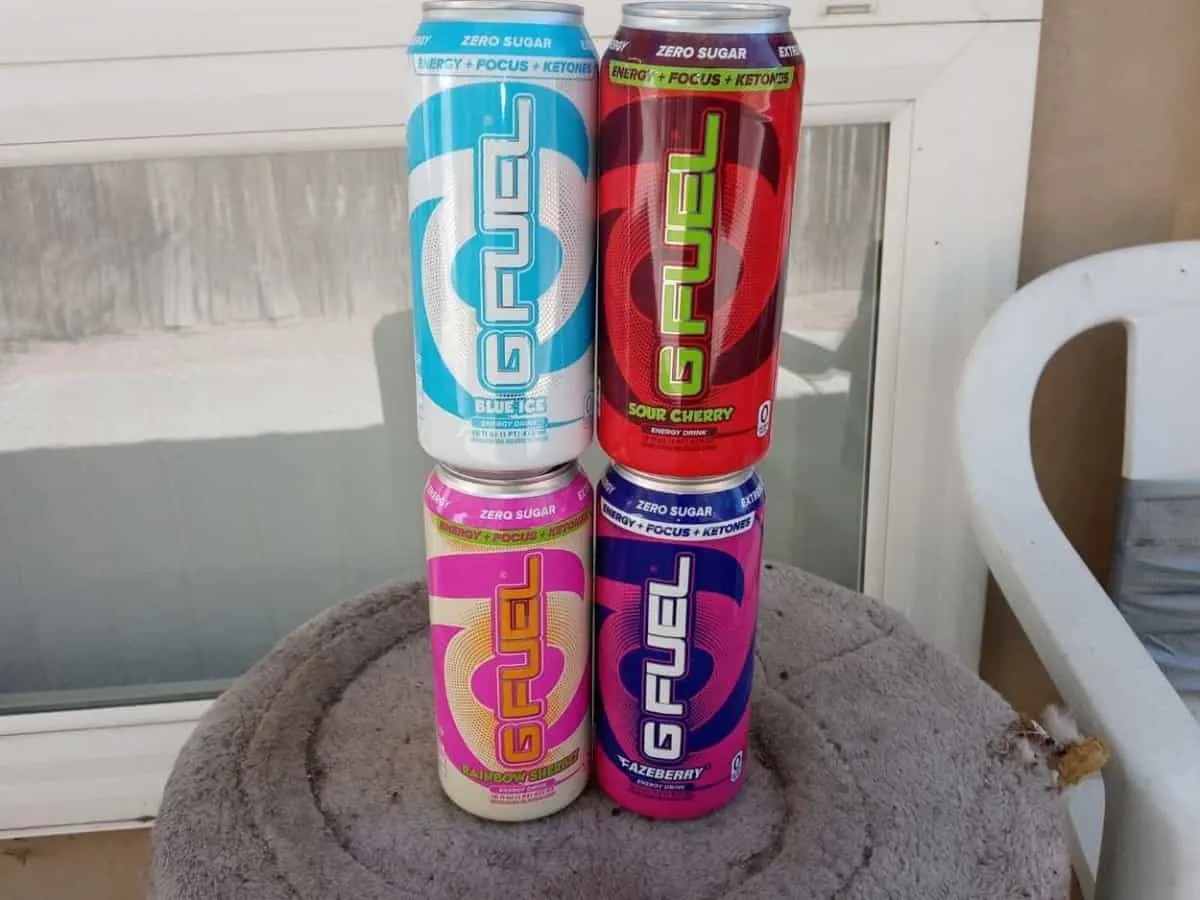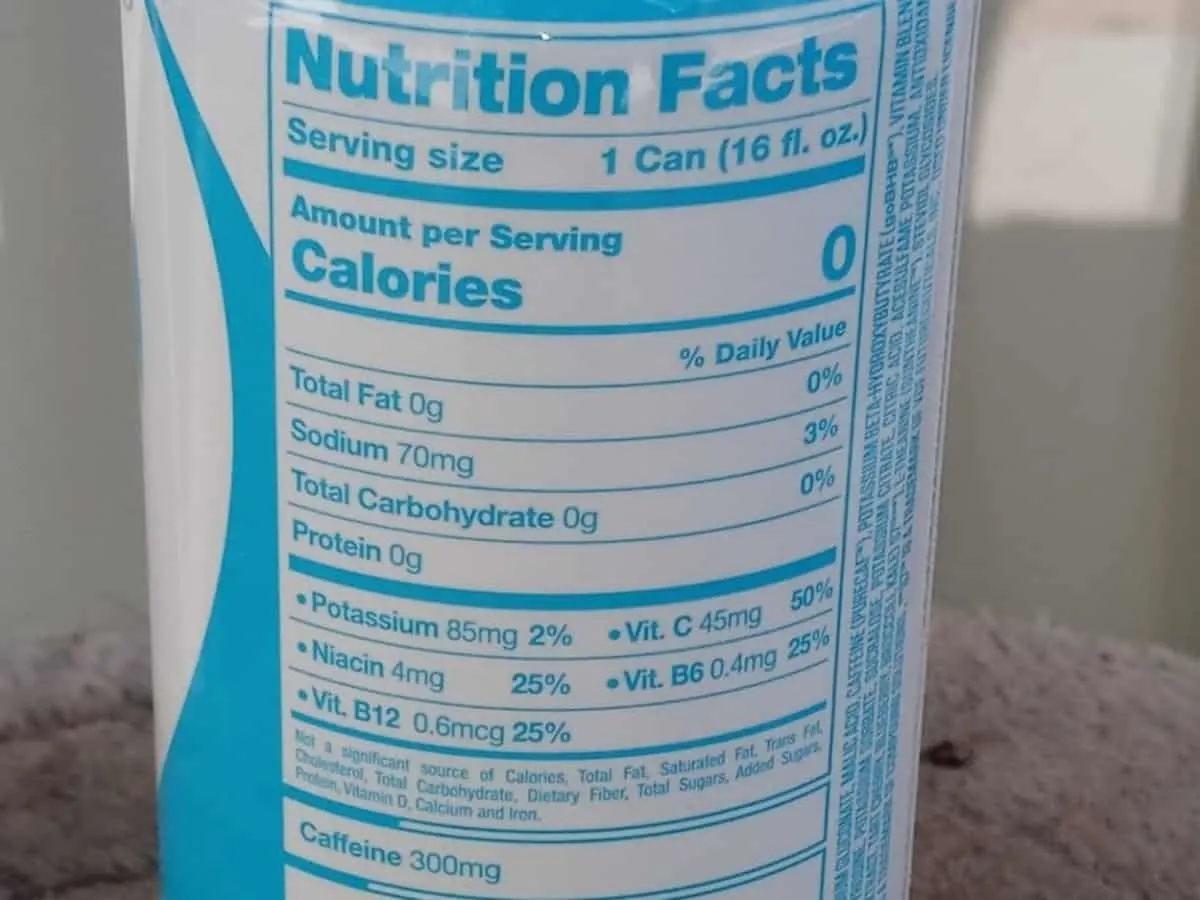Caffeine is known for its ability to improve mental alertness. It can be found in many food sources and beverages including, energy drinks.
Energy drinks like G Fuel cans have been popular among athletes, gamers and teenagers who need an extra push in their daily activities.
But despite its popularity, is it safe to consume more than one can a day?

The recommended daily serving, as per G Fuel’s official page is 1 can a day. This is perfect for those who are always on the go and people without any health restrictions. However, there are many factors to consider when it comes to drinking caffeinated drinks such as age, health condition, lifestyle, and so on.
To learn more about G Fuel cans and its effect, read through the article and see if G fuel is the right fit for you.
Contents
G Fuel Can Nutrition Facts

Let’s start with G Fuel’s nutritional facts. You can see this at the back of the can. This will serve as a guide especially for those who are diagnosed with minor or serious diseases.
| Nutrient | Amount per Serving (16 fl. oz) |
| Calories | 0 |
| Total Carbohydrates | 0g |
| Sugar | 0g |
| Sodium | 70mg |
| Protein | 0g |
| Potassium | 85mg (2%) |
| Niacin (Vitamin B3) | 4mg (25%) |
| Vitamin B6 | .04mg (25%) |
| Vitamin B12 | .06mcg (25%) |
| Vitamin C | 45mg (50%) |
| Caffeine | 300mg |
How Many Calories are in a G Fuel Can?
G Fuel cans are considered a zero calorie product.
Although many brands, including G Fuel, claim to have no calories per serving, there’s no such thing as zero-calorie food or negative-calorie food. The only thing you can consume without contributing to your daily calorie intake is water.
Why is there a zero calorie label then?
According to the FDA, companies are allowed to use the zero-calorie label on their products if it has 5 or fewer calories overall.
Meanwhile, “negative calorie” foods like cucumbers are actually just food that takes up more energy (calories) getting digested than they contribute.
But what are calories to begin with?
Calories are a measure of the energy you get from food and beverages. That makes them something your body needs in order to stay healthy and functional throughout the day.
The reason why weight loss guides keep telling you to cut down on them is that the excess calories are stored as fat. Not because calories are actually bad for you on their own.
How do you know if you’re taking in excess then?
In general, the recommended daily calorie intake is 2000 for women and 2500 for men. However, how much your body really needs depends on a lot of factors. These include your age, lifestyle, health condition, and body size.
Is There Sugar in G Fuel Cans?

G Fuel cans are sugar-free, only use artificial sweeteners, and natural flavorings to give it its sweet taste.
Artificial sweeteners are a sugar substitute that is used to reduce the sugar content of products to make them more appealing from both a calorie and taste perspective, most especially to those who want to lose weight.
They’re also several times sweeter than sugar and are considered zero-calorie products.
G Fuel uses two kinds of artificial sweeteners: Sucralose (Splenda) and Acesulfame Potassium (Ace-K).
Sucralose is derived from sucrose (sugar) and is made in a lab. It’s processed through a process that has three hydrogen-oxygen groups replaced by chlorine molecules.
This process results in a chemical structure that keeps sucralose from being absorbed by the gastrointestinal system. That way, your body doesn’t absorb it.
Sucralose is also 600 times sweeter than sugar.
Acesulfame Potassium is also made through a chemical process in a lab. It’s synthesized by combining acetoacetic acid with potassium. The result is a white powder that can be used to sweeten food, but has a bitter after taste.
The aftertaste is the reason why Ace-K is usually mixed with sucralose when used to sweeten things despite being 200 times sweeter than table sugar.
G Fuel cans also use Steviol Glycoside, a natural sweetener
Steviol Glycoside is derived from the Stevia rebaudiana plant from Brazil. It also has another name you might know it by—Bertoni plant. It’s made by extracting the steviol glycoside from the Bertoni plant’s leaves. After that, the steviol chemical is purified to remove the bitter aftertaste and make it fit for consumption.
Like the artificial sweeteners abovementioned, Stevia sweeteners are calorie-free, whiile still being 200-350 times sweeter than sugar.
Likewise, Stevia is not absorbed by the gastrointestinal tract when digested. This is why it’s also considered a calorie-free product and why it doesn’t contribute to one’s blood sugar level.
However, when it reaches the colon, the gut bacteria takes out the glucose molecules and uses them as an energy source. After that, the remaining stevia in the structure is absorbed, processed by the liver, then excreted in the urine.
G Fuel Can Ingredients
There are several other ingredients found in G Fuel such as the following:
- Carbonated Water
- Natural Flavors
- Artificial Flavors
- Sodium Gluconate
- Malic Acid
- Caffeine
- Potassium Beta-Hydroxybutyrate
- Maltodextrin
- Vitamin C
- Vitamin B3
- Vitamin B6
- Vitamin B12
- L-Tyrosine
- Sucralose
- Potassium Citrate
- Citric Acid
- Acesulfame Potassium
- Green Coffee Bean Extract
- Green Tea Extract
- Turmeric Extract
- Tart Cherry
- Blueberry
- Broccoli
- Kale
- L-Theanine
- Steviol Glycosides
How Much Caffeine is in a G Fuel Can?

A single 16 fl.oz serving of G Fuel contains 300mg of caffeine, which is about the same as .
Caffeine is a stimulant that promotes alertness and makes the body work faster when its effects are active. This makes it the opposite of alcohol, which is a depressant.
Caffeine is commonly found in coffee, soft drinks, teas, and chocolate. It’s also the ingredient that gives energy drinks like G Fuel the punch they’re known for when combined with other substances.
Caffeine achieves this effect by blocking adenosine. Adenosine is a hormone your brain secretes to promote sleep and tiredness as time passes. This makes caffeine in all its forms great for keeping you awake and alert when you need to be. It can also help improve your focus during difficult tasks
However, caffeine isn’t without its side effects. It can help you through your tasks for sure, but overdoing caffeine can be detrimental to your health.
The most common side effects of caffeine are:
- Insomnia
- Anxiety
- Headaches
- Foul mood
- Faster than usual heartbeat
- Muscle tremors/”Twitching”
The FDA recommends drinking no more than 400mg of caffeine a day to avoid a caffeine overdose. This is the most a healthy adult can be expected to safely consume.
So to put this into perspective, a G Fuel can’s caffeine content (300mg) takes up 75% of your daily caffeine limit.
What are the Vitamins in a G Fuel Can?
G Fuel cans are sources of Vitamin B3, Vitamin B6, Vitamin B12, and Vitamin C.
Like many energy drinks, G Fuel contains B-vitamins. B-vitamins are believed to aid your metabolism and other important functions in your body when consumed. They and Vitamin C are also water-soluble, so any excess you have in your body gets passed through urine.
What this means is that you’re very unlikely to get an overdose of any of the vitamins in G Fuel from food and drink alone.
Vitamin B3 (Niacin) is an important mineral that can also be found in liver, chicken, and Tuna. Like any other B Vitamin, it helps you absorb nutrients and turn them into energy for your daily activities. What’s unique about it is that it can lower bad cholesterol and ease arthritis.
Vitamin B6 (Pyridoxine) is responsible for producing red blood cells and neurotransmitters. You can find it in food through poultry, leafy greens, and chickpeas.
Vitamin B12 (Cobalamin) is needed for red blood cell synthesis, supporting your eyes, and DNA synthesis. However, it’s most known for the belief that it can boost energy, improve memory, and help prevent heart disease. Foods that can give you Vitamin B12 include shellfish, dairy products, and cheese.
Vitamin C (Ascorbic acid) is an antioxidant that helps in fighting the effects of free radicals in the body to ease the strain it goes through. Free radicals cause oxidation reactions that in turn cause illness when they pile up. Foods that have Vitamin C are citrus fruits and broccoli.
Are G Fuel Cans Bad For you?
One can of G Fuel isn’t bad for you but it can bring several side effects if taken irresponsibly.
This is mainly because of the G Fuel caffeine content of 300mg per serving, which can put you at risk if you’re sensitive to caffeine. Plus, it’ll take even less to make you lose sleep or experience high blood pressure.
If you want to know more about what energy drinks in general could mean for your health, check out the video. There, the host details some studies about the effects of energy drinks on a person’s health.
Many of the studies featured in the video are about Red Bull though. So the results might be significantly different compared to what they would have been if they used G Fuel instead.
Conclusion
If you have good overall health, you can follow the 3 can per day recommendation by G Fuel. But for those who wish to lose a few pounds or suffering from a disease, it’s best to stick to one G Fuel daily.
Although it’s sugar free and adds very few calories to your diet, the amount of caffeine you get from it could be a recipe for disaster. Depending on what else you eat and drink on the same day, that 300mg could easily bring you past the healthy limit.
To put it into perspective, 1 cup of coffee has 95-100mg of caffeine. Meanwhile, if you drink a G Fuel can in one sitting, you immediately get 3 cups of coffee worth of caffeine.
That means you’re basically getting what most people drink in servings spread throughout a whole day in one sitting. So I really think you should think carefully about how often you drink this kind of G Fuel.
But then again, you could be fine with 2 cans (600mg of caffeine) if you already have a significant caffeine tolerance. Still, I wouldn’t encourage you to take the risk even in that scenario. That said, I do also think there are people who should be staying far away from these cans.
Pregnant women, children, adolescents should definitely not drink G Fuel cans. People who are sensitive to caffeine should also stay away from G Fuel cans.
This is also mentioned in the official website’s FAQ and the label at the back of any G Fuel can.
Although pregnant women and minors are not wholly incapable of safely consuming caffeine, they need to take much less than most people to stay healthy. 300mg could easily put them at risk in that case.
